|
July 13, 2005
RV-ing: Another Creative, Even Affordable
Way to Integrate Travel into your Lifestyle
Non-mainstream forms of travel have fascinated me for a long time.
Combine that with affordable travel and the possibility to make
the travel experience a full-time lifestyle, and I am intrigued
even more.
In researching the topic, and particularly the cost angle, I found
out that a new tent trailer would probably cost from about C$5,000
and up, I figured that's a pretty good entry level price for exploring
the RV-ing lifestyle. Of course a bus-type Class A motorhome is
going to probably run you from about C$70,000 and up for a new model
while a travel trailer can probably be purchased from about C$12,000
and up. So depending on your taste and your preference for built-in
luxuries, there are all sorts of recreational vehicles out there
that might fit your pocket book and your travel plans.

For a while now I have wanted to investigate RVing, the concept
of using recreational vehicles for short-term trips or even permanent
lifestyles so I contacted the Canadian RVing Assocation to get more
practical information about this form of travel. Catherine Fleming
from www.gorving.ca
was willing to take her time and enlighten us about this travel
option.
1. Please tell us about the RVing lifestyle.
There doesn’t seem to be a definition of the “RVing”
lifestyle. An RV is a recreational vehicle that combines transportation
and living quarters for travel, recreation and camping. An RV is
suitable for vacations and weekend trips any time of year and there
are even some people who RV on a full-time basis.
2. What types of recreational vehicles are there and how
do they differ? How difficult is it to drive an RV?
RVs are divided into 3 main categories:
(1) Towable RVs - designed to be towed by a car,
SUV, mini-van or pickup truck. These can be unhitched on arrival
at a campsite making the tow vehicle available for use while the
RV remains stationary. Types of towable RVs are: folding camping
trailers, truck campers, travel trailers and fifth-wheel travel
trailers.
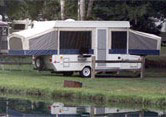 |
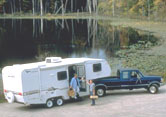 |
| A tent trailer |
A "Fifth Wheel" |
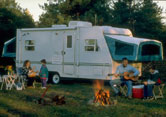 |
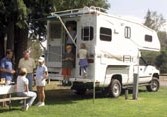 |
| A travel trailer |
A truck camper |
(2) Motorized RVs – RVs that you drive, combining
transportation and living quarters in one unit. Ranging from vans
up to large bus size, all models can tow a family car. Types of
motorized RVs are Class A motorhomes, Class B camper vans and Class
C mini-motorhomes.
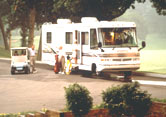 |
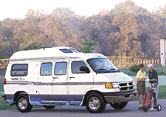 |
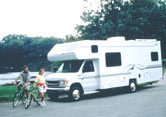 |
| Class A motorhome |
Class B camper van |
Class C mini motorhome |
(3) Park Model RVs. These are RVs with complete
living quarters designed for seasonal use. Types of the Park Model
Trailer 102 and the Park Model Recreational Unit.
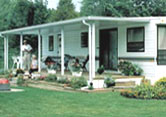 |
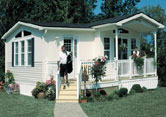 |
| Park Model Trailer 102 |
Park Model Recreational Unit |
3. How difficult is it to drive an RV?
Today’s RV models are as simple to drive as the family car.
Every motorhome is equipped with power steering, brakes, and automatic
transmission, resulting in a driving experience similar in many
respects to driving a van. You don’t have to have the muscles
of a truck driver to steer the vehicle, or the legs of a marathon
runner to bring it to a stop… everything is adjusted to provide
controls that feel just about the same as your typical family car…
it’s just bigger!
Novice RV drivers only need a few minutes behind the wheel to become
accustomed to the size and clearance requirements of a motorhome.
Many new RV drivers are surprised at the enhanced visibility you
enjoy when driving a big rig. Large windshields, mirrors, and optional
rear-vision TV monitor systems give you a view of the highway that
exceeds anything you are likely to find in a passenger car or van.
Sitting in the captain’s chair, above the majority of the
vehicles on the road, you can see what’s happening all around
you much better than the average motorist can – and that’s
a safety plus that makes motorhomes one of the most relaxing vehicles
on the road today.
4. Please tell us about RVing possibilities in Canada, the US and
Mexico. What type of amenities will I find in an RV campground?
There are campgrounds to suit everyone’s taste from large
RV parks with every kind of luxury and amenity to beautiful remote
wilderness campsites.
A study conducted by Go RVing Canada reveals that almost 24% of
RVers fall into the category of owners who take the longest trips,
have the highest incomes and are most willing to pay for premium
services. It seems freedom of the open road is not the only thing
these folks are looking for. They want a destination with all the
facilities that they would expect from a fly-in vacation. Luxurious,
manicured, private facilities that offer fishing, golf, tennis,
community centers, health spas and more.
Upscale parks are popping up right across North America with resorts
found in Canada, the United States and Mexico. Often requiring large
tracts of land these sites are rural, even isolated – which
most often provides the perfect backdrop for a relaxing, scenic
vacation. It also sets up the resort to be all-inclusive; serving
today’s healthy, active RV lifestyle.
Resorts offer short and long-term rentals but also time-share type
parks, straight property ownership, reciprocal camping memberships
and even non-profit resorts owned wholly by their members. Freedom
from ownership (which is often what attracts new RVers), is also
very attractive. You have the freedom to come and go, visiting the
same places each year or never visiting the same place twice. Most
visitors to RV resorts stay for at least a few days, and many for
months. In fact, long term stays are encouraged with the rental
price often cheaper the longer you stay.

Great for family travel
5. Please tell us about the benefits of being a member
of an RV club.
The best way to get involved in the RV lifestyle is to join a club.
You will find that members of RV clubs all share the same enthusiasm
for adventure. Most experienced RVers discover that each RV club
is different and often join more than one club just so they don’t
miss out on any of the fun. Some RV clubs organize rallies and tours.
There’s even a club single people who enjoy traveling, camping
and the RV lifestyle.
Besides national and provincial RV clubs, many RV manufacturers
have organized “user groups” for clubs for their RV
owners. Contact the manufacturer of your RV to find out if there
is club. You may be able to find other members near you to discuss
interesting ways of modifying your RV or to share tips and ideas.
RV clubs are a great way to share experiences, get together for
rallies and make a lot of new friends.
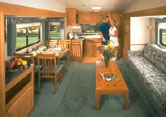
The inside of a travel trailer
6. What type of people go RVing and why?
Who and why? Young families with kids. The family gets to spend
more time together, the kids can sleep in their own beds anytime
and they can eat when they’re hungry.
Busy career couples. The RV is ready to go when they are. They
can leave at any time for however long they want. Have fun, relax.
People with lots of time. People with not so much time but who just
want to get away for a few days.
People who love the outdoors. Explore the countryside, new places,
spend the night in your own piece of paradise, discover nature every
morning and every night.
Retired people. Make new friends and neighbours, live life to the
full at their own pace, travel to places they’ve always wanted
to see.
Travelers on a budget. Great accommodation at the lowest price,
meals and drinks will cost the same as at home, save money.
7. RVing is often referred to as a money-saving way of
travel. What are the costs involved in RVing and the potential money
savings over other forms of travel?
Costs involved include the cost of buying or renting a unit and
insurance as well as the cost of gas. If you prepare your own meals
you will probably pay the same amount for groceries as you would
at home. You will save money on restaurant meals and hotel rooms.
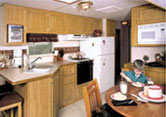
Inside of a Park Model Trailer 102
8. Would it be possible for me to simply rent an RV to
explore if I actually like the RVing experience?
Definitely. It’s a good way to find out if you would like
to spend more time RVing and also to find out what types of options
you really can’t live without. A number of RV dealerships
also rent RVs and you can find a list on the Go RVing Canada web
site: www.gorving.ca
9. What advice would you give someone who is thinking of
becoming an RVer?
Take a good look around at the different types of units there are
by visiting RV dealers and RV shows that take place across Canada
in the winter and fall of each year. You can find listings of RV
shows and dealerships on the Go RVing Canada website. Carefully
consider how you might want to use an RV – full-time or part
time.
10. What options are “must haves” in an RV
and which options can you do without ?
Visit the Go RVing Canada web site at www.gorving.ca
. There is a wealth of information there – from who to
where to how-to. There are lists of RV Clubs, RV Shows & Sales,
manufacturers, dealers, campgrounds, driving tips, where can I rent
an RV and lots of RV FAQs.
Thank you, Catherine, for sharing your knowledge of recreational
vehicles with us, another item in our travel tool chest.
Useful books for RV travel:
|